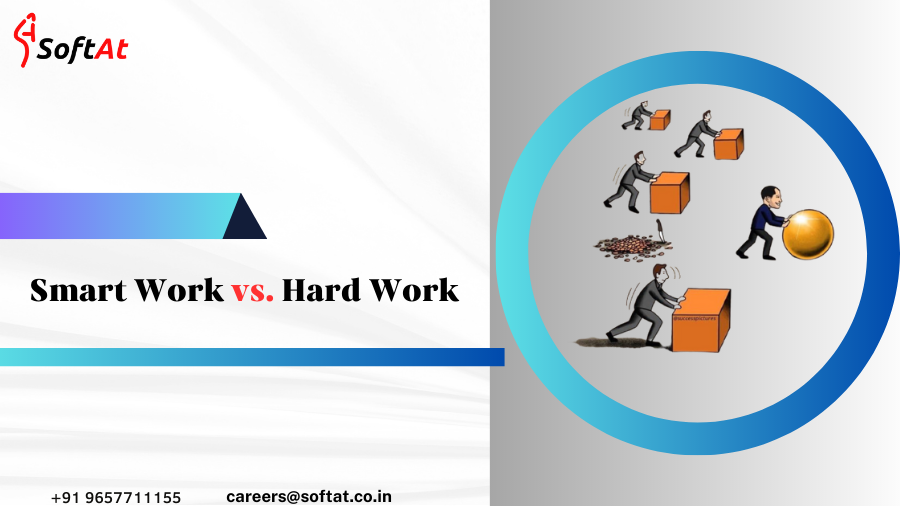Smart Work vs. Hard Work: Which is Better?
The age-old debate of smart work vs. hard work has been a topic of discussion for many years. While both have their merits, it’s important to understand the difference between the two and how they can impact your success. In this article, we’ll explore the benefits and drawbacks of both smart work and hard work.
Hard Work:
Hard work refers to the effort and time put into a task or project. It’s often associated with long hours, dedication, and perseverance. Here are some benefits and drawbacks of hard work:
Benefits of Hard work :
Builds discipline: Hard work requires discipline, focus, and dedication. By putting in the time and effort required to achieve a goal, you can develop these qualities and apply them to other areas of your life.
Increases skill level: Hard work helps you improve your skills and knowledge in a particular area. Whether it’s learning a new language, mastering a new software program, or developing a new skill, hard work is necessary to achieve success.
Enhances confidence: Hard work can increase your confidence by giving you a sense of accomplishment and achievement. By setting goals and working hard to achieve them, you can feel proud of your accomplishments and develop a positive self-image.
Foster’s perseverance: Hard work requires perseverance and determination. By pushing through challenges and setbacks, you can develop a resilience that will serve you well in all areas of your life.
Builds character: Hard work can help you develop strong character traits such as grit, tenacity, and perseverance. These qualities are essential for success in all areas of life, and they can help you overcome obstacles and achieve your goals.
Provides a sense of purpose: Hard work gives you a sense of purpose and direction. By setting goals and working hard to achieve them, you can feel a sense of purpose and direction in your life.
Improves outcomes: Hard work improves outcomes by increasing the chances of success. By putting in the time and effort required to achieve a goal, you can improve your chances of achieving success and reaching your full potential.
Drawbacks:
Burnout: One of the biggest drawbacks of hard work is burnout. Working too hard for too long can lead to exhaustion, stress, and a lack of motivation. This can lead to a decline in productivity and can even cause physical and mental health problems.
Lack of work-life balance: Hard work can lead to a lack of work-life balance. When you’re focused solely on work, it can be challenging to find time for personal activities, hobbies, and relationships. This can lead to feelings of isolation and loneliness and can negatively impact your mental health.
Health problems: Hard work can lead to physical health problems such as back pain, eye strain, and carpal tunnel syndrome. Sitting at a desk for long periods can also increase the risk of obesity, heart disease, and other health issues.
Limited creativity: Hard work can limit creativity because it often requires focusing on specific tasks and following set procedures. This can make it difficult to think outside the box and come up with innovative solutions to problems.
Lack of spontaneity: Hard work can lead to a lack of spontaneity in life. When you’re constantly working, it can be challenging to find time for impromptu activities and experiences.
Decreased motivation: Working too hard for too long can lead to a decrease in motivation. When you’re constantly pushing yourself, it can be challenging to maintain the same level of motivation and enthusiasm for your work.
Negative impact on relationships: Hard work can have a negative impact on relationships with friends and family. When you’re constantly working, it can be challenging to find time for social activities, and this can lead to feelings of isolation and strain on relationships.
Smart Work:
Smart work refers to the approach taken toward a task or project. It’s about working smarter, not harder, by using efficient and strategic methods to achieve your goals. Here are some benefits and drawbacks of smart work:
Benefits:
Increases productivity: Intelligent work helps you get more done in less time. By focusing on the most important tasks and using tools and technology to increase efficiency, you can achieve more in a shorter amount of time.
Saves time: Smart work helps you save time by automating repetitive tasks, delegating responsibilities, and prioritizing tasks. By working smarter, you can free up time to focus on other important tasks or enjoy leisure activities.
Improves work-life balance: Intelligent work helps you achieve a better work-life balance by freeing up time for personal activities and reducing stress. By prioritizing tasks and using technology to increase efficiency, you can reduce the time and effort required for work-related tasks.
Increases job satisfaction: Smart work helps you feel more satisfied with your Task by reducing stress, increasing productivity, and providing a sense of accomplishment. By achieving more in less time, you can feel a sense of pride in your work and feel motivated to continue improving.
Enhances creativity: Smart Task encourages creativity and innovation by challenging you to find new and better ways to achieve goals. By using technology and problem-solving skills, you can find creative solutions to problems and achieve more than you thought possible.
Increases profitability: Smart work can increase profitability by reducing costs, increasing productivity, and improving efficiency. By finding ways to work smarter, you can improve your bottom line and achieve greater success.
Improves collaboration: Smart work encourages collaboration by using technology to facilitate communication and teamwork. By leveraging tools like project management software, instant messaging, and video conferencing, you can work more effectively with team members and achieve better results.
Drawbacks:
Limited creativity: Smart work often involves finding quick solutions to problems and completing tasks in a streamlined way. This can limit creativity and can make it difficult to come up with innovative solutions to problems.
Reduced quality: In an effort to complete tasks quickly, there may be a tendency to compromise on quality. This can lead to errors and mistakes that can have negative consequences in the long run.
Lack of depth: Smart work often involves surface-level problem-solving, rather than a deep understanding of the issue at hand. This can result in incomplete or superficial solutions to complex problems.
Over-reliance on technology: Intelligent work often involves utilizing technology to streamline tasks and increase efficiency. However, over-reliance on technology can result in a lack of human connection and may make it more difficult to develop interpersonal skills.
Burnout: While Intelligent work is designed to increase efficiency, it can also lead to burnout. A focus on completing tasks quickly can result in long working hours and a lack of work-life balance.
Limited learning opportunities: Smart work can limit learning opportunities by focusing on completing tasks quickly, rather than developing new skills or exploring new ideas.
Lack of adaptability: Smart work often involves following set processes and procedures. This can limit the ability to adapt to changing circumstances and can make it more difficult to respond to unexpected challenges.
What is the best example of SMART work?
A great example of SMART work is the implementation of an effective project management methodology for a team. Let’s break down how this example aligns with the SMART criteria:
- Specific: The project management methodology establishes clear objectives, roles, and responsibilities for team members. It defines specific project goals, deliverables, and timelines.
- Measurable: The methodology includes metrics and key performance indicators (KPIs) to track progress and measure success. It establishes criteria to assess project milestones, task completion, and overall project performance.
- Achievable: The methodology is designed to be practical and attainable within the given resources, skills, and time constraints of the team. It considers the capabilities and limitations of the team members and ensures that goals can be realistically achieved.
- Relevant: The project management methodology is aligned with the overall goals and objectives of the organization. It focuses on projects that are strategically important and contribute to the success of the business.
- Time-bound: The methodology includes clear timelines and deadlines for each phase of the project. It ensures that tasks are completed within specific timeframes and that the project progresses efficiently.
By implementing a SMART project management methodology, teams can improve their productivity, efficiency, and overall project success. It provides a structured approach to planning, executing, and monitoring projects, enabling teams to work smarter, achieve their goals, and deliver successful outcomes.
The role of both
Smart work enhances hard Tasks: Smart work and hard work are complementary to each other. Smart Tasks can help to optimize hard work, allowing you to achieve more in less time. It can help you to identify the most critical tasks, prioritize them, and allocate your resources more efficiently. This, in turn, can enhance the effectiveness of your hard work.
Hard work complements smart work: Hard work can complement smart work by providing the necessary foundation for success. Without hard work, even the most brilliant ideas and strategies will not be effective. Hard work provides the discipline, perseverance, and determination to overcome obstacles and achieve goals.
Smart work helps to conserve resources: Smart work helps to conserve resources, such as time, energy, and money. It allows you to identify the most efficient ways to achieve your goals, reducing the time and effort required to complete tasks.
Hard work provides a sense of purpose: Hard work provides a sense of purpose and accomplishment. It allows you to develop your skills and expertise, build your confidence, and achieve your goals. Hard work also helps to build resilience and perseverance, which are essential qualities for achieving success.
Smart work helps to maximize outcomes: Smart work helps to maximize outcomes by focusing on the most critical tasks and using available resources in the best possible way. It allows you to achieve more in less time, enabling you to accomplish more in your personal and professional life.
conclusion
In conclusion, both smart work and hard work are crucial to achieving success. Hard work is necessary to develop discipline, perseverance, and a strong work ethic, while smart Task involves utilizing resources effectively and efficiently to achieve goals. However, both approaches have their limitations, and it’s important to find a balance between the two. By combining the strengths of both approaches, individuals can achieve success while also maintaining their physical and mental health, developing new skills, and enjoying a fulfilling personal life. Ultimately, the key to success is to Task hard, work smart, and remain adaptable to changing circumstances.





